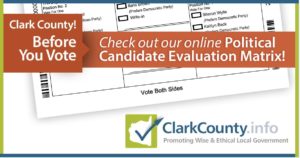
Political opinions are everywhere—and they are usually worth the price we pay for them. We can have fun listening to Cliff’s political opinions from the end of the bar and the frequently absurd reasoning behind them. We can listen to political pundits on the radio or psychic hotline lady tell us about who they think should be elected to office. However we should realize we live in a culture of broken information, where people are quite comfortable letting emotion drive opinion, where many journalist are left-of-center activists, and editors sensationalize stories to attract the pliable viewers wanted by advertisers. This is especially true for political information. A thinking person would ignore it as useless in deciding how they would vote.
Why in God’s name, then, would we give any attention to the editor of a newspaper when they make their political endorsements? When did it happen that they would be the authoritative voice of who America should vote for?
It doesn’t matter if the newspaper is liberal or conservative. Good news publications should stick to facts, not make the news. Newspapers are generally considered trustworthy by their readers, and they capitalize and abuse that trust when they endorse political candidates. It’s overt, and an insult to the intelligence of their readers. The mere fact that they publish a daily journal does not give them a special insight or authority that other people lack. Reading the Journalist Creed by Walter Williams show the ideal. When newspapers publish their agenda-driven picks for an election, they’re trying to influence elections and make news. This clearly breaches the creed.
So how did newspapers get into the political candidate endorsing business? Well, it may have started thousands of years ago when the ancient politicians and the news reporters found common interests. You see, they’re human. Over a hundred years ago Mark Twain asserted that you should “Never pick a fight with people who buy ink by the barrel.” This was because the newspaper had a monopoly on mass communication and they developed a certain arrogance that comes along with such dictatorial control. Making the news would fit right in with this arrogant attitude—especially with ideological editors.
Because newspapers have done this so long, for anyone to suggest such practices are illegitimate wouldn’t be understood by journalists and would be rejected with a sneer. It’s the culture that journalists have the duty to project their beliefs. It’s this culture that produces reams of propaganda as compared to useful news. Again the Journalist Creed is comprehensively breached in this culture.
It’s certainly worth noting that newspapers bias their reporting whether or not they endorse candidates. Basic journalism is to tell the story in the headline, tell it again in the first paragraph, and then the remaining story is told in order of importance. That way the reader can read to their level of interest without worrying about missing something important. The question is, who decides what’s important? Careless editing can bias a news report simply by what the writer chooses to report and omit. We see this today with headlines screaming that white cops have killed another black man. One news organization may concentrate on the reaction of the community, the prayer vigils, the protests, and the pandering by the NAACP. Another might highlight that the dead man was a paroled felon, suspect in a recent armed robbery, was armed and resisting arrest. Both stories may be factually true, however lead readers to different impressions.
It seems unlikely that newspaper endorsements have any effect on the political landscape among voters who exhibit the slightest tendency towards self-awareness. The founding fathers assumed that the voting franchise would be exercised by citizens familiar with the candidates or the issues in question. If you’re one of those people for whom a newspaper endorsement is the deciding factor in your political decision process, it might be better for all concerned if you just avoided the trouble of voting altogether.

The proper role of newspapers is to present the facts to the voters in as unbiased a fashion as possible. This is what we’ve tried to do at ClarkCounty.info with our candidate evaluation process, which is systemically designed to negate bias as much as possible. The information provided is intended to be useful regardless of your political leanings.
Whether it’s Cliff Clavin at the end of the bar in Cheers, George Will, Cecilia the Psychic, or Lou Brancaccio of the Columbian, all their endorsements are just the opinion of people almost always with an agenda. Since most opinions are faulty, they all must be assumed faulty until careful vetting is done. If a majority of citizens followed this thinking, the crooked politicians, biased media, and special interests would be out of business in a few years. The world would be transformed.
